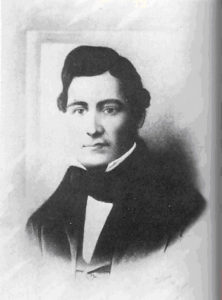
Joseph Vann
*Joseph Vann was born on this date in 1798. He was a Native American Cherokee leader, businessman, slave owner, and planter.
Joseph H. Vann was born in Spring Place, Georgia. He and his sister Mary were children of James Vann and Nannie Brown, both Cherokee of mixed blood with white-European ancestry. James Vann was a powerful chief in the Cherokee Nation and had several other wives and children. They were among the Five Civilized Tribes of the American Southeast because they had adopted some white-European-American culture, often from traders who intermarried with the Cherokee. His paternal grandparents were Joseph Vann, a white-Scottish trader, and Mary Christiana, a Cherokee woman.
At age 11, he was in the room when his father James was murdered in Buffington's Tavern in 1809 in Forsyth County, GA, about 70 miles from the family home in Murray County. Eventually, the Cherokee Council granted Joseph the inheritance in line with his father's wish; this included 2,000 acres of land, trading posts, river ferries, and the Vann House. Joseph also inherited his father's gold and deposited over $200,000 in gold in a bank in Tennessee.
President Andrew Jackson issued the Indian Removal Act of 1830 to authorize the forced removal of tribes to new lands west of the Mississippi River in exchange for the cession of their lands in the Southeast to allow development by European-American planters. In 1834 Vann was evicted from his father's Georgia mansion, "Diamond Hill," as part of this process. He moved his two wives and several children and business operations to Tennessee. Vann established a large plantation on the Tennessee River near the site of Harrison, Tennessee, and much later, Harrison Bay State Park, Tennessee's first state park.
In 1837 before the main Cherokee Removal, Vann transported a few hundred Cherokee men, women, children, enslaved Africans (including 200 of his own), and horses aboard a flotilla of flatboats Webbers Falls at the falls of the Arkansas River in Indian Territory. He developed a plantation and directed enslaved people to construct a replica of his lost Georgia mansion. This building was later destroyed during the American Civil War. Vann also built up his steamboat business, sending his boats throughout the Mississippi tributaries and New Orleans.
In 1842, the Slave Revolt in the Cherokee Nation occurred. Slaves of Joseph Vann, Lewis Ross, and other wealthy Cherokee at Webbers Falls revolted with guns and horses to escape from the Indian Territory to Mexico. They picked up more fugitives in Creek territory. Fourteen enslaved people were killed or captured in a conflict with a small party of pursuers, who turned back for reinforcements. The other fugitives continued to the south. They were recaptured by a posse organized by the Cherokee Council. Five of the fugitives were executed for killing two slavecatchers in Choctaw Territory.
Vann put his surviving slaves to work as crew members of his steamboat, Lucy Walker. On October 23, 1844, Lucy Walker's steamboat departed Louisville, Kentucky, bound for New Orleans. The vessel was destroyed below New Albany, Indiana when one or more boilers blew up. This explosion killed Joseph Vann.